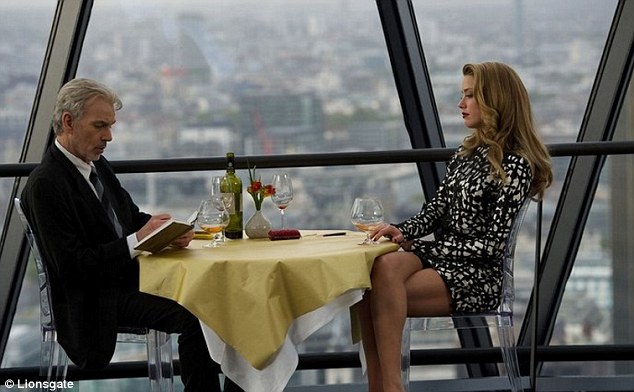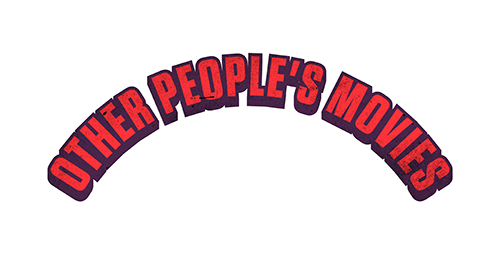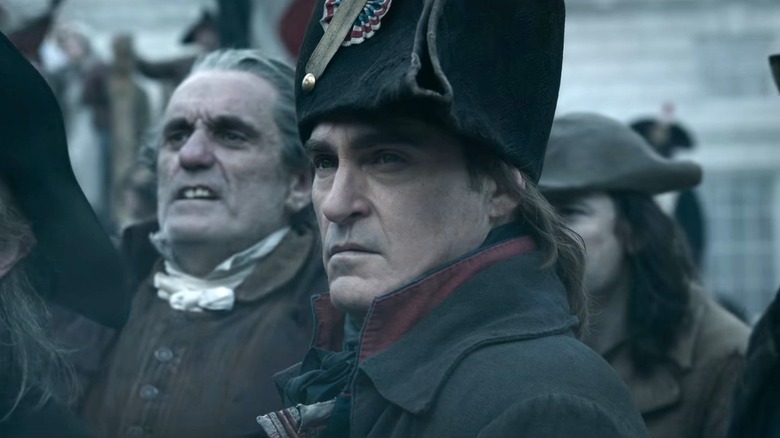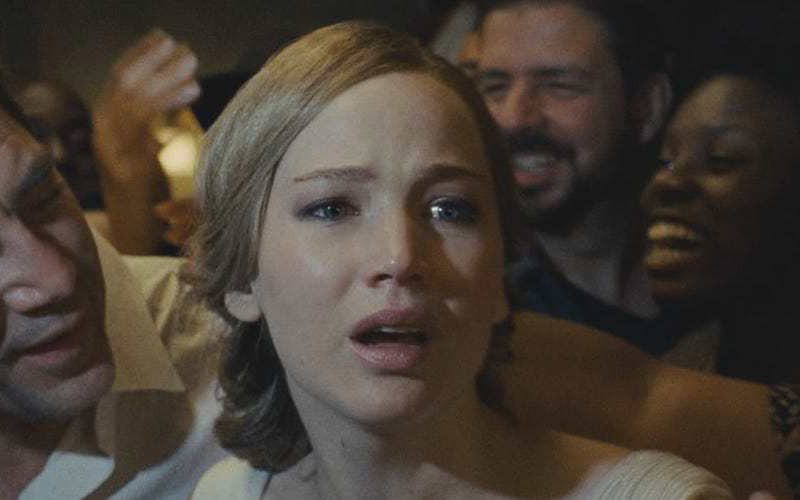
Aside from the small fraction of the country that shelled out a collective $168,575 for the second-worst wide-release opening weekend in U.S. history, nobody saw London Fields when it came to theaters in October of 2018. Critics trashed it and the public quickly wrote it off as a failed vanity project for actors Billy Bob Thorton, Amber Heard, and (in an uncredited supporting role) Johnny Depp. On closer inspection, however, the film and the story behind making it both run far deeper than anyone could have imagined.
London Fields is based on Martin Amis’ much-celebrated novel of the same name. Considered by many to be an unfilmable, mind-meddling masterwork along the lines of Naked Lunch or Fear & Loathing in Las Vegas, the adaptation went through various permutations in preproduction for over a decade. Eventually, it entered production in 2013 with acclaimed commercial and music video director Mathew Cullen at the helm for his feature debut.
As of this writing, what happened in the five years between London Fields’ production and its unveiling has only been detailed in an article published by The Hollywood Reporter and in a podcast of The Director’s Cut. In short, two different groups within the film’s thirty-eight credited producers completed two different edits of the film behind Cullen’s back while Cullen used his personal finances to complete his own cut. Through some complicated legal loopholes, different producers’ cuts have been released internationally and both the final producers’ cut and Cullen’s cut were released domestically—though Cullen’s only had one confirmed theater screen it.
Cullen’s cut has since been buried and seen by few—which is a shame. The director’s cut of London Fields is surprisingly a very good, at times even great, movie that intelligently realizes the potential squandered in the producers’ theatrical cut. While both cuts essentially tell the same story, their execution is so wholly different that it’s hard to believe Cullen and the producers ever found the common ground needed to begin production in the first place.

The film takes place in a (somewhat) fictionalized version of London (the book was published in 1989 and set in the then-future year of 1999), where it is a decaying urban wasteland brought to decline by rioting and the imminent threat of nuclear attack. Samson Young (Thorton) is a talented but commercially unsuccessful novelist who has recently arrived seeking inspiration for his next work. He soon finds it in the form of Nicola Six (Heard), a sultry and self-aware pastiche of femme fatale archetypes. Six claims to be a clairvoyant who can see the outcome of everyone’s death, including her own. She knows she will be murdered on her upcoming birthday, she just doesn’t know by whose hand—though she does have it narrowed down to Young, a hopelessly bored and wealthy banker (Theo James), and a small-time crook/darts-wielding gambler (Jim Sturgess). When Young discovers this, he asks Six if he can write her story. She agrees, and the film becomes a complex tale told by an increasingly unreliable narrator—one where fiction and nonfiction blur to a surreal and mind-bending degree.
The theatrical cut of London Fields is not quite as abysmal as its Rotten Tomatoes scores will lead to you to believe. It’s a stylish, beautifully photographed (by frequent Guillermo Del Toro and Robert Rodriguez collaborator Guillermo Navarro) neo-noir with a head-scratching premise full of intrigue and ambiguity. However, it merely skims the surface of its best qualities in favor of an obnoxious and contrived presentation.
Relying on artistic pizazz and blatant absurdity, the theatrical cut of London Fields plays like it’s afraid of being too cerebral. Whatever intelligence the story holds is dumbed-down and spoon-fed. Hyper-edited to reach a forced fast pace most of the performances don’t match, it’s like a wannabe-Guy Ritchie caper without the excellent taste in music or testosterone-fueled storyline to justify its flashy style.
The four lead performances are amongst the greatest casualties of the theatrical cut. Sturgess gives the most broad and stylized performance in the film as Keith Talent, a sleazy thug trying to fend off his sadistic bookie (Depp). The theatrical cut makes the mistake of pushing the entire style of the film in his performance’s direction, making Sturgess’ work all the more annoying and at odds with the other actors—most of who appear to be acting in a completely different film.
Theo James’ portrayal of Guy Clinch, the emasculated but obscenely rich banker, also suffers. While his character’s personal misery is slightly clearer (and more amusingly absurd) than it is in Cullen’s cut, he comes off as nothing more than a simple and buffoonish joke. There’s no shading to provide any insight into what’s pulling him into Six’s tangled web.

Perhaps the most telling fault of the theatrical cut lies is in its presentation of the Nicola Six character and her relationship with Samson Young. Heard has been critically attacked for her performance, recently earning a Razzie nomination for one of the worst performances of 2018. Sadly, it’s semi-understandable considering how one-dimensional she comes across in the theatrical cut. She appears to be acting in a Zucker Brothers noir spoof, highlighting all the obvious qualities of a femme fatale without humanizing any of them. Thorton furthermore comes off as a flat-line, stoically reacting to Heard’s seemingly cartoonish caricature and unable to communicate why he would have any draw to her in the first place.
There’s no way of understanding just how fully the theatrical cut misses its mark until you’ve seen Cullen’s. The steady and slow-building pace of his cut is ideal for character and thematic development. He makes it clear that the characters are designed to be meta-satirical stereotypes. London Fields’ story and themes rely on stripping their clichés down to reveal deeper—and dramatically resonant—motivations underneath. The theatrical cut ignores this while Cullen’s bases its entire emotional and intellectual pay off around it.
In Cullen’s cut, Sturgess gloriously sticks out like a sore thumb, giving a highly theatrical performance that is intended to be in its own orbit. Now at odds with (instead of celebrating) the film’s tone, his weaknesses and macho posturing read painfully (and humorously) clear. James’ performance also plays completely different. Though we lose some of the more amusing details of his personal life in Cullen’s cut (I did miss a scene from the theatrical cut where his demonic child attacks Thorton’s character), he’s now clearly caught up in the plot because of a deep-seated emotional need rather than simple dimwittedness and boredom.
Heard’s and Thorton’s performances benefit the most from Cullen’s cut, where Heard and Cullen are obviously in on the “joke”. Six creates her identity according to men’s expectations of her–in spite of knowing it will be the eventual cause of her demise. The men in her life only see what they want to see, and she takes advantage of them only because their blindness creates the necessity. In Cullen’s cut, Heard’s performance is a thoughtful and nuanced embodiment of these themes, not the simplistic representation of femininity that completely misses the point in the theatrical cut.
In Cullen’s cut, the aching loneliness of Six’s reality is clearly at the core of her and Young’s relationship. Thorton no longer comes across as detached or disinterested. He is now hypnotized and entranced, bonded to Six because of his own alienation and failures in life. They are both characters lost in a world they (maybe) didn’t create, but are continuously forced to create within it to survive.

Perhaps the most glaring difference between the two cuts lies in their music cue selections. The soundtrack in Cullen’s cut is as much a part of its fabric as anything else. Almost everything that works about it is substituted with something more painfully obvious and frustratingly lifeless in the theatrical version.
Cullen—who has directed videos for Katy Perry, Beck, R.E.M, and many others– clearly has a talent for working with music. It would have been wise for the producers of London Fields to utilize it. The soundtrack to Cullen’s cut features a hauntingly beautiful score by Toydrum and a carefully chosen selection of pop songs that are often (sometimes literally) bent to fit the psychological landscape of the story. Toydrum’s quietly sad and insanely gorgeous theme for Six–which sets up the complex tone of the film and her character–is unjustifiably replaced in the theatrical cut with a jazzy noir theme that is as forgettable as it is stale.
Cullen’s cut, for better or for worse, is a singular vision. Taking a cue from its experimental source material, it refuses to subscribe to any one genre or tone and examines its story from various emotional standpoints. While the film is unquestionably a dark comedy in both cuts, Cullen’s edit isn’t as saturated in its absurdity–it’s a mere color in a much grander palette. Highlighted by spectacular and disturbing montages of nuclear warfare, Cullen’s cut effectively communicates a constant undercurrent of dread, paranoia, and instability that is barely touched upon in the theatrical edit.
Cullen’s approach may have frightened the producers into thinking his cut would alienate mainstream audiences—and they were probably correct in that assumption. While Cullen’s cut could have used a slight amount of perspective outside of his own (it is somewhat difficult to follow in its set-up), it never should have been mutated into something at such odds with his vision—which only needed a small amount of support and collaboration. London Fields was never going to appeal to everyone–no matter what form it took. Cullen’s cut embraces this and thrives while the theatrical cut fights it, only to become a lesser film with a neutered identity as a result.
Unfortunately, only the theatrical version of London Fields is available on home video and there are presently no plans to release the director’s cut. Perhaps its day will come with a little more luck, publicity, and time. Cullen’s cut is an entrancing film and a potential cult classic, a hodgepodge of Hitchcock, Welles, Lynch, Gilliam, and Alex Cox told from a modernized and bent pop culture perspective. If the theatrical cut is Pop Trash, the director’s cut is Pop Kubrick.
There are many lessons to be learned from London Fields. It’s a film that simply cannot be anything but what it is and failed because it tried to be something it’s not. The producers of London Fields meddled with gold, polishing away its most valuable assets until they found themselves holding nothing but an indisputable turd.
DIRECTOR’S CUT GRADE: A-
THEATRICAL CUT GRADE: C-



